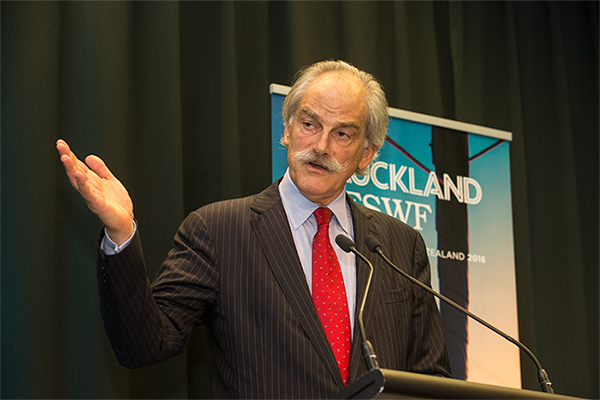Lipsky: global economic outlook "favourable".
At the International Forum of Sovereign Wealth Funds (IFSWF) held in Auckland from 8-11 November, economist and former managing director of the IMF John Lipsky debunked the arguments put forth by others, such as Bob Prince, Bridgewater associates, and Massimiliano Castelli, UBS Asset Management (see previous blogs) that the world economy would see low interest rates and low growth for the foreseeable future. “Despite the alternatives and the pessimism, the outlook, and trend analysis, the consensus forecast isn’t that bad,” he said, adding that “if it [an improvement in the global economy] can be achieved in a structural sense it will start to improve the performance and expectations that I think is going to set the stage ..for a much more favourable outlook ahead.”
 Lipsky also said that he was “instrumental” in establishing the Santiago Principles, and although they had been “controversial” they had helped to improve transparency and accountability.
Lipsky also said that he was “instrumental” in establishing the Santiago Principles, and although they had been “controversial” they had helped to improve transparency and accountability.
The Principles are a voluntary code that highlight that stability, as well as the economic and financial purposes, are the defining features of sovereign capital. They provide 24 items of practical guidance on the institutional governance and risk management frameworks necessary for sound long-term investment practice.
A shortfall in investment is the principal cause of sluggish global growth, he said. “An investment shortfall is the key explanation for disappointing productivity growth,” and one of the reasons for this is the failure to install new technology, he added.
He also said that the shock of the global financial crisis (GFC) had left investors with not only doubts but with long-term risk aversion and added: “Another factor that I think slows down the process, and hasn’t been talked about much, is financial sector reform, in other words, cleaning balance sheets. “This is most likely to be seen in advanced economies (AE) and in the euro zone,” where growth and investment in the euro zone has been sluggish.
“The reliance on euro zone finance, or bank finance, as compared with the securities markets is profound,” he noted, which explains why “recovery has been slow.
“Moreover, the two principal charges of the Financial Stability Board are to enhance financial system stability, and to create an open playing field. I would maintain that this is a task that is very much in progress and that financial services are more balkanised now than they were before the crisis.”
Lipsky also said that there is an intense focus on “anti-money laundering and terrorism activities” that has helped to collapse correspondent banking relationships “with very little ameliorative actions to try and compensate for these effects.
“When we look at AE growth (including the IMF outlook, which is a consensus view) it is uneven”, he said, with the US expected to accelerate slightly, Japan very slowly, and the euro zone “sideways”, and has seen no growth since 2007.
“For emerging economies trade growth has outstripped GDP growth,” he said, adding that future growth has to be tackled by fiscal policy, monetary policy and infrastructure growth.
Lipsky also noted that the G20 ministers said of the global economy that it is “weak and fragile and subject to downside risks.” However, he said that with the use of structural reforms, “my guess is that the issue of confidence and credibility is going to improve. The risks are real, but are generally policy related.”
And although “there are new political risks in Europe, such as Brexit- “Europe is instrumental for getting the economy on track,” he said. (see graph).

Comments